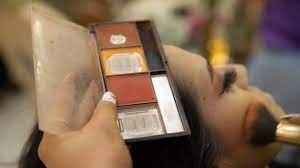
A total of 60,000 jobs are expected to be lost as a result of their closure.
Since the Taliban retook power two years ago, salons had been permitted to continue operating. However, this month, the Taliban changed its mind.
The choice severely limits the facilities available to Afghan women, who are already prohibited from using gyms, parks, and schools.
When word of the impending shutdown reached Zarmina, 23, she was getting her hair dyed a dark brown color in a beauty parlor.
“The owner was in disbelief and broke down in tears. She provides for her family’s needs financially, the mother of two claimed.
“I was unable to even look in the mirror while having my brows done. Everyone was sobbing. Silence prevailed.
Zarmina resides in Kandahar, the conservative capital of the Taliban where the supreme leader is housed.She claims that it’s typical for men to forbid their daughters from getting cosmetic procedures or wearing makeup in this country.
Most women here wear a burqa or a hijab when walking around. It has been ingrained in our culture.
At age 16, Zarmina was hitched. She claims that a brief conversation with the beautician was sufficient to give her a rare sense of freedom.
“I wasn’t allowed to leave my house on my own, but I managed to persuade my husband, and I was allowed to visit the beauty salon two or three times a year.”
She formed a close bond with one of the staff members while frequenting the salon with a local woman.
“Women used to discuss techniques to sway their husbands in the past. Some individuals were honest about their insecurities.
But after the Taliban regained control of the nation in August 2021 as a result of the withdrawal of US soldiers from the region, the economic crisis had steadily crept into their life.
Since then, the freedoms of women have gradually decreased.
According to Zarmina, women today exclusively discuss poverty, prejudice, and unemployment.
When Madina leaves the house, she wears a scarf over her head. Her husband and female family members are the only ones who can see her colored hair.
The 22-year-old, who resides in Kabul, is an avid online follower of the newest fashions in beauty.
“Every lady I know enjoys developing her personal style. I enjoy donning makeup and wearing the newest styles.
She claims that coming to the spa has kept her marriage young.”My spouse truly enjoys seeing my hair in a variety of colors and cuts.
She happily exclaims, “He always drives me to the beauty parlor and waits patiently at the door.
When I leave, he remarks on how good I look, which makes me feel good.
Her dream was to practice law, but the Taliban forbade women from attending college. Since women are prohibited from many other roles, she has been unable to find employment.
Madina vividly remembers going to the salon with her mother when she was a little girl and witnessing how women would freely exchange life experiences.
The salon’s female staff no longer dress in skirts or jeans; instead, they all wear hijabs.
Fear permeates everything.
Nobody likes to discuss politics, and nobody knows who supports the Taliban.
Grooms used to be able to observe their bride getting ready. Even Madina recalls seeing several males taking pictures inside the salon. All of this is now prohibited.
Madina claims that she at least has happy memories of her “big day” to treasure, nevertheless.
Before my wedding last year, I went to the beauty parlor and had complete bridal makeup, she explains.
“I was so gorgeous when I glanced in the mirror. I changed as a result. I struggled to express my joy.
A beauty shop is essential for Somaya, a 27-year-old from Mazar-i-Sharif in northwest Afghanistan.
After a heater in her room blew up three years ago, she sustained facial burns and lost her eyelashes and eyebrows.
I found it difficult to look at my own face. She continues, her voice filled with anguish, “I looked horrible.
“I believed that everyone was staring at and making fun of me because my eyebrows were missing. I didn’t leave the house for a few months. I shed a lot of tears at that time.
She received medical care to treat her injuries, and the beauty parlor assisted her in regaining her sense of self.
“I visited a beauty parlor and had microblading done, a semi-permanent cosmetic tattooing technique. I looked significantly better as a result,” she claims.
“I broke down in tears when I glanced at my brows. They are happy tears. My life was restored by the spa.
Somaya is a mental health counselor with a master’s degree in psychology. Since the Taliban imposed severe restrictions, she has noticed an increase in the number of women seeking her services. She is not the only person who uses the beauty salon as “therapy”.
“Salons are more than just somewhere to get your makeup done for us. It enabled us to bury our grief. It inspired us and gave us hope.
Zarmina concurs. That June day, after making what would be her final trip to the salon, she kept gazing back as she made her way home.
She knew exactly what she was losing—her meager attempt at independence.
“At the salon, I paid for myself, and that gave me power and strength. I have money, yet I am unable to treat myself to a trip to the spa or salon. Because of this, I feel bad.


Share your thoughts